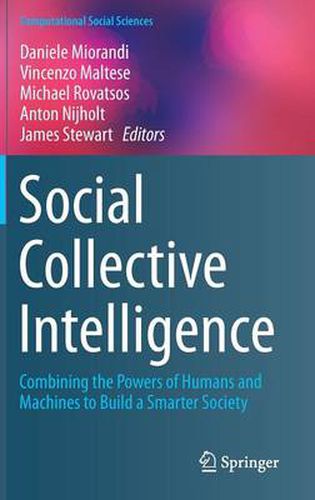Readings Newsletter
Become a Readings Member to make your shopping experience even easier.
Sign in or sign up for free!
You’re not far away from qualifying for FREE standard shipping within Australia
You’ve qualified for FREE standard shipping within Australia
The cart is loading…






This title is printed to order. This book may have been self-published. If so, we cannot guarantee the quality of the content. In the main most books will have gone through the editing process however some may not. We therefore suggest that you be aware of this before ordering this book. If in doubt check either the author or publisher’s details as we are unable to accept any returns unless they are faulty. Please contact us if you have any questions.
The book focuses on Social Collective Intelligence, a term used to denote a class of socio-technical systems that combine, in a coordinated way, the strengths of humans, machines and collectives in terms of competences, knowledge and problem solving capabilities with the communication, computing and storage capabilities of advanced ICT. Social Collective Intelligence opens a number of challenges for researchers in both computer science and social sciences; at the same time it provides an innovative approach to solve challenges in diverse application domains, ranging from health to education and organization of work. The book will provide a cohesive and holistic treatment of Social Collective Intelligence, including challenges emerging in various disciplines (computer science, sociology, ethics) and opportunities for innovating in various application areas. By going through the book the reader will gauge insight and knowledge into the challenges and opportunities provided by this new, exciting, field of investigation. Benefits for scientists will be in terms of accessing a comprehensive treatment of the open research challenges in a multidisciplinary perspective. Benefits for practitioners and applied researchers will be in terms of access to novel approaches to tackle relevant problems in their field. Benefits for policy-makers and public bodies representatives will be in terms of understanding how technological advances can support them in supporting the progress of society and economy.
$9.00 standard shipping within Australia
FREE standard shipping within Australia for orders over $100.00
Express & International shipping calculated at checkout
This title is printed to order. This book may have been self-published. If so, we cannot guarantee the quality of the content. In the main most books will have gone through the editing process however some may not. We therefore suggest that you be aware of this before ordering this book. If in doubt check either the author or publisher’s details as we are unable to accept any returns unless they are faulty. Please contact us if you have any questions.
The book focuses on Social Collective Intelligence, a term used to denote a class of socio-technical systems that combine, in a coordinated way, the strengths of humans, machines and collectives in terms of competences, knowledge and problem solving capabilities with the communication, computing and storage capabilities of advanced ICT. Social Collective Intelligence opens a number of challenges for researchers in both computer science and social sciences; at the same time it provides an innovative approach to solve challenges in diverse application domains, ranging from health to education and organization of work. The book will provide a cohesive and holistic treatment of Social Collective Intelligence, including challenges emerging in various disciplines (computer science, sociology, ethics) and opportunities for innovating in various application areas. By going through the book the reader will gauge insight and knowledge into the challenges and opportunities provided by this new, exciting, field of investigation. Benefits for scientists will be in terms of accessing a comprehensive treatment of the open research challenges in a multidisciplinary perspective. Benefits for practitioners and applied researchers will be in terms of access to novel approaches to tackle relevant problems in their field. Benefits for policy-makers and public bodies representatives will be in terms of understanding how technological advances can support them in supporting the progress of society and economy.